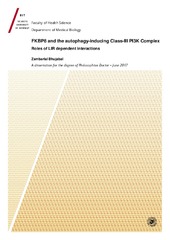| dc.contributor.advisor | Johansen, Terje | |
| dc.contributor.author | Bhujabal, Zambarlal | |
| dc.date.accessioned | 2017-10-30T14:45:03Z | |
| dc.date.available | 2017-10-30T14:45:03Z | |
| dc.date.issued | 2017-09-22 | |
| dc.description.abstract | Autophagy (Greek meaning “self eating”) is a renovation process in cells. Dysfunctional autophagy plays a major role in human diseases including cancer, inflammatory and neurodegenerative diseases. Misfolded or aggregated proteins, damaged organelles, such as mitochondria, endoplasmic reticulum and peroxisomes, as well as intracellular pathogens are degraded by autophagy. During the process, the components that are going to be degraded are encapsulated by a double membrane structure called the autophagosome, which delivers its contents to the lysosome for degradation.
Mitochondria is an important cellular organelle, providing energy to the cell by generating the energy molecule adenosine triphosphate through oxidative phosphorylation. This process generates reactive oxygen species that may lead to DNA damage and mutations, as byproducts. Therefore, a healthy population of mitochondria is critical for the well-being of cells. Mitophagy is the selective degradation of mitochondria by autophagy, mediated by specific proteins sitting on the mitochondria outer surface. These proteins cooperate with autophagosomal membrane proteins to deliver the damaged or surplus mitochondria to the lysosome.
The PhD thesis work of Zambarlal Bhujabal carried out in the Molecular Cancer Research Group, under guidance of Professor Terje Johansen, focuses on the process of mitophagy and the formation of autophagosomes. This work identifies the outer mitochondrial protein FKBP8 as a mitophagy-mediating protein. FKBP8 was found to cooperate with the autophagosomal membrane protein to clear damaged mitochondria. Interestingly, FKBP8 was further identified to stimulate autophagy in general, probably mediated by interactions with specific proteins at different steps of the autophagy process.
In addition, some of the important proteins involved in the formation the autophagosome forming a Phosphatidylinositol kinase complex required for generation of autophagosomes were studied. It was found that ATG14, Beclin-1 and VPS34 bound to the autophagosomal membrane protein GABARAP via short sequence motifs. Notably, during this work, FKBP8 was also found to interact with the Phosphatidylinositol kinase complex member, Beclin-1. | en_US |
| dc.description.doctoraltype | ph.d. | en_US |
| dc.description.popularabstract | Autophagy (Greek-eating of self), is a renovation process in cells, breaking down its own unhealthy components. The components to be degraded are collected into a double membrane vacuole known as ‘autophagosome’ which delivers its content for destruction in the lysosome. Mitochondria are the “power stations” of cells that produce energy. However, like an old “diesel engine” they may also produce toxic radicals that damages the cell. The damaged mitochondria are degraded by a selective autophagy process called mitophagy.
The PhD thesis work of Zambarlal Bhujabal carried out in Molecular Cancer Research Group, guided by Professor Terje Johansen, focuses on mitophagy, and identified a new protein, FKBP8, which cooperates with the autophagosomal membrane protein LC3A to carry out mitophagy. In addition, it was found that ATG14, Beclin-1 and VPS34 of the Phosphatidylinositol kinase complex bind to the autophagosomal membrane protein GABARAP positioning them for autophagosome formation. | en_US |
| dc.description.sponsorship | I deepely appreciate the funding for my PhD work from Norwegian Research Council, Norwegian Cancer Society and University of Tromsø. | en_US |
| dc.description | The papers of this thesis are not available in Munin. <br>
Paper I: Bhujabal, Z., Birgisdottir, Å. B., Sjøttem, E., Brenne, H. B., Øvervatn, A., Habisov, S., Kirkin, V.,
Lamark, T., Johansen, T.: “FKBP8 recruits LC3A to mediate Parkin-independent mitophagy”. Available in <a href=http://dx.doi.org/10.15252/embr.201643147> EMBO reports 2017, 18:947-961. </a>
<br>
Paper II: Bhujabal, Z., Sjøttem, E., Birgisdottir, Å. B., Øvervatn, A., Brenne, H. B., Lamark, T., Johansen, T.: «FKBP8 interacts with Beclin-1 and promotes autophagy”. (Manuscript).
<br>
Paper III: Birgisdottir, Å. B., Mouilleron, S., Bhujabal, Z., Wirth, M., Lee, R., O’Reilly, N., Tooze, S. A.,
Lamark, T., Johansen, T.: “Members of the autophagy-inducing class III PI3K complex interact preferentially with GABARAP-family proteins via LIR motifs”. (Manuscript). | en_US |
| dc.identifier.uri | https://hdl.handle.net/10037/11695 | |
| dc.language.iso | eng | en_US |
| dc.publisher | UiT The Arctic University of Norway | en_US |
| dc.publisher | UiT Norges arktiske universitet | en_US |
| dc.rights.accessRights | openAccess | en_US |
| dc.rights.holder | Copyright 2017 The Author(s) | |
| dc.rights.uri | https://creativecommons.org/licenses/by-nc-sa/3.0 | en_US |
| dc.rights | Attribution-NonCommercial-ShareAlike 3.0 Unported (CC BY-NC-SA 3.0) | en_US |
| dc.subject | VDP::Medical disciplines: 700::Basic medical, dental and veterinary science disciplines: 710::Medical biochemistry: 726 | en_US |
| dc.subject | VDP::Medisinske Fag: 700::Basale medisinske, odontologiske og veterinærmedisinske fag: 710::Medisinsk biokjemi: 726 | en_US |
| dc.subject | VDP::Medical disciplines: 700::Basic medical, dental and veterinary science disciplines: 710::Medical molecular biology: 711 | en_US |
| dc.subject | VDP::Medisinske Fag: 700::Basale medisinske, odontologiske og veterinærmedisinske fag: 710::Medisinsk molekylærbiologi: 711 | en_US |
| dc.title | FKBP8 and the autophagy-inducing Class-III PI3K Complex
Roles of LIR dependent interactions | en_US |
| dc.type | Doctoral thesis | en_US |
| dc.type | Doktorgradsavhandling | en_US |


 English
English norsk
norsk



